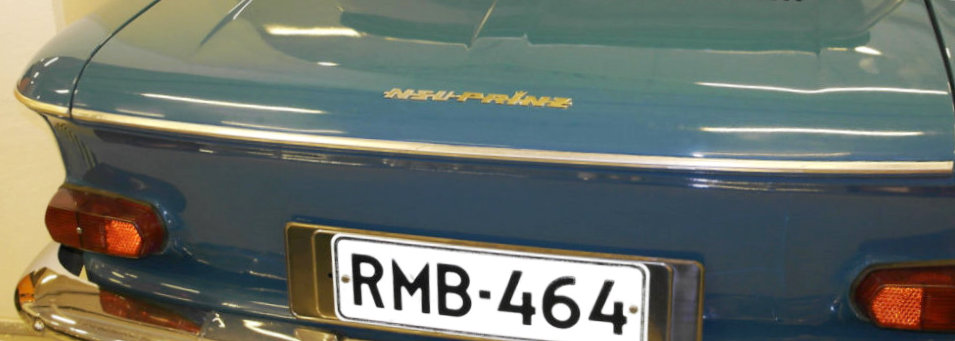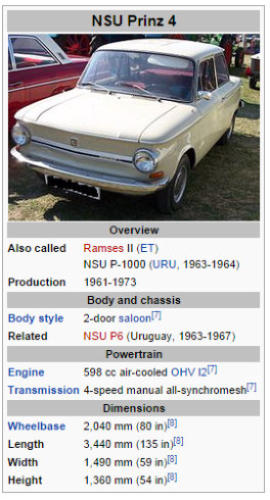



Fahre Prinz und Du bist König

NSU Prinz 4 - 1961
The NSU Prinz is an automobile produced in West
Germany by the NSU Motorenwerke AG. The car was built
from 1957 to 1973, and received a model change in 1961
(the old model was continued until 1962).
One
of
the
revelations
of
the
Frankfurt
Motor
Show
in
September
1961,
the
Prinz
4
replaced
the
original
Prinz.
Its
new
body
closely
resembled
the
then
fashionable
Chevrolet
Corvair,
but
was
of
course
much
smaller.
Like
the
original
Prinz,
it
was
powered
by
a
two-cylinder
air-cooled
engine
in
the
rear.
The
Prinz
4
was
much
improved
and
continued
to
be
a
well-engineered
car,
like
its
predecessors.
The
engine
carried
on
the
tradition
of
eccentric
rod
driven
camshaft
inherited
from
NSU
motorcycle
engines
and
interestingly
had
a
dynastart
(combined
starter/generator)
built
into
the
crankcase.
Later
four-cylinder
engines
adopted
the
more
conventional
(pre-
engaged) separate starter motor and alternator.
In
1968,
Britain's
Autocar
road
tested
a
Super
Prinz.
They
had
tested
a
Prinz
4
in
1962,
and
in
commenting
on
how
little
the
car
had
changed
in
the
intervening
six
years
quipped
some
of
their
road
testers
appeared
to
have
gained
more
weight
than
the
commendably
light-weight
Prinz
in
that
period.
The
test
car
achieved
a
top
speed
of
113
km/h
(70
mph)
and
accelerated
to
97
km/h
(60
mph)
in
35.7
seconds.
The
home
grown
Mini
850
reached
97
km/h
(60
mph)
in
29.5
seconds
in
an
equivalent
recent
test
and
also
managed
to
beat
the
NSU's
top
speed,
albeit
only
by
about
3%.
At
this
time,
the
UK
car
market
was
heavily
protected
by
tariffs,
and
the
Prinz's
UK
manufacturer's
recommended
retail
price
was
£597,
which
was
more
than
the
(possibly
below
cost)
£561
asked
for
the
850
cc
Mini,
but
certainly
not
completely
out
of
touch
with
it.
The
testers
concluded
their
report
that
the
car
was
competitively
priced
in
its
class
and
performed
adequately.
They
opined,
cautiously,
it
offered
'no
more
than
the
rest'
but
neither
did
it
'lack
anything important'.

1961
Engine 598 cc Top speed 113 km/h Lenght/width 3,4 m/1,49 m

Photos mainly by Matti Kreivilä. Historical facts and technical details of the vehicles provided by Wikipedia. Movies YouTube.


- Decade of 60's
- Austin 850 Pickup - 1962
- Chaika Tshaika 13 GAZ - 1962
- Citroen 2CV - 1961
- DKW Junior - 1961
- Fiat 1100 - 1963
- Ford Taunus 12M - 1961
- GLAS 1204 - 1963
- MG 1100 - 1964
- Moskvich 407 - 1961
- Nagetusch caravan - 1961
- NSU Printz 4 - 1961
- Opel Kadett A - 1964
- Panhard PL17 - 1961
- Peugeot 404 - 1962
- Renault Dauphine - 1965
- Simca Aronde P60 - 1960
- Simca 1000 - 1966














